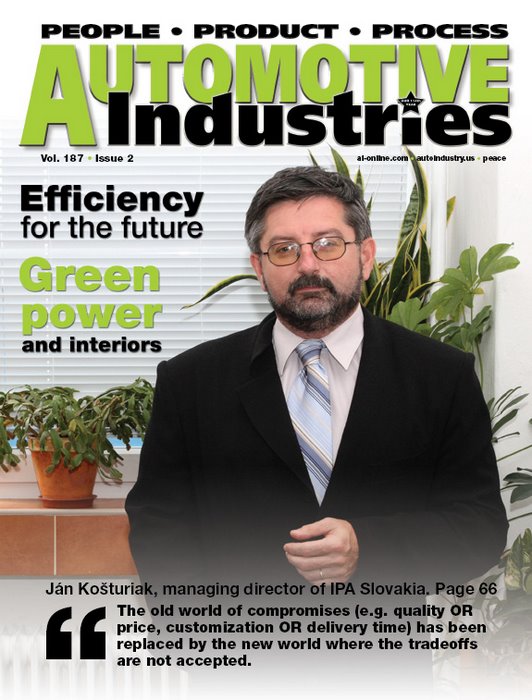
About 4% (more than 3,3 mil) of the cars produced worldwide are made in the former Eastern European region that includes Slovakia, the Czech Republic and neighboring countries. The forecast of this region for 2015 is about 7,5% of worldwide annual car production.
One of the driving forces behind this success is IPA Slovakia, which was established by the Fraunhofer Gesselschaft and the University of Žilina to help industries in Slovakia, the Czech Republic, Poland, Hungary, and Slovenia find ways to quickly implement the latest productivity, quality, flexibility, innovativeness and enterprise organization methods.
Today, Fraunhofer IPA Slovakia claims to be the leading consultancy and educational organization in the areas of industrial engineering and lean methods, Six Sigma and Systematic Innovation in Central Europe. Automotive Industries spoke to Dr Ján Košturiak, managing director of IPA Slovakia.
AI: What is the current situation in the automotive industry of Central and Eastern Europe – both with OEMs as well as suppliers?
Košturiak: Some years ago Volkswagen analyzed more than 470 production locations in Europe. The analyzed factors were – work force potential, production and logistical costs, production density, life quality and environment quality, infrastructure, research development, private service network, political stability, etc. They selected five locations – 1. Bratislava (Slovakia), 2. Mlada Boleslav (the Czech Republic), 3. Györ (Hungary), 4. Poznan (Poland) and 5. Cluj (Romania). Volkswagen started production in the first four locations. Now all the important car manufacturers, as well as their suppliers, are producing there (Peugeot, Citroen, Daimler, Ford, Fiat, GM, Toyota, Suzuki, Renault, Hyundai. KIA, etc.)
AI: What problems face the industry?
Košturiak: In many locations the logistical costs are very high, because the suppliers of the parts are located in the West European countries. Some years ago, the VW plant in Bratislava (Slovakia) had three times higher logistical costs than the similar plant in Spain (both plants produced the VW Polo).
The solution is supplier parks. More than 25 supplier parks have been developed and established in Europe in the recent years. Another reason for higher logistical costs is the trend of increasing value creation by suppliers. Over the next few years, suppliers should produce more than 75% of car value and OEMs only 25%. Mass customization by European manufacturers also increases the logistical costs in comparison with many Japanese and American car producers. But the biggest problem for all the producers in Central Europe is a shortage of skills (workers but also specialists for logistics, industrial engineering, etc.).
AI: Why do many European producers have lower productivity than Japanese companies?
Košturiak: There are many reasons for lower productivity – not sufficient co-operation between product development, process planning, logistics and production or higher logistical costs because very high variability of the different parts and materials in car configuration. There is more waste in production and logistical processes – e.g. waiting for material, higher inventories, rework, etc.
Typical management focus in many companies is on the short term results, not on the development of employees, their skills and the culture of continuous improvement process (kaizen). “Savings at whatever cost” – this is a slogan that can be heard in many firms with a little bit of humorous exaggeration. Often, the result of this is thoughtless outsourcing that brings lower costs per product or service on the paper, but total costs eventually grow up.
Managers need to deal with developing the potential – human potential in particular. “Improve people around you and they will improve processes; our people do not go to the firm to work, they go there to think; the principal task of our managers is to teach their colleagues“ – these are the principles of one of the most successful manufacturing companies in the world. The word “teacher” means that managers need to learn and improve themselves, too; they need to be a role model for their colleagues both in professional and human terms. This is the only way of replicating genes in the corporate DNA, but this is also the way of gaining respect and regard for each other that is missing in many companies. In every firm there is one more “hidden firm” – unused potential and capacity of machines and staff. Another problem is that people often buy inadequate equipment with capacities and technical features that cannot be fully utilized at the company. This increases unnecessary fixed costs. Expensive and complex equipment can be risky for flexibility of the business, too. Several companies are dealing with issues of simple modular equipment and low-cost automation.
AI: Please tell us about the research and consulting areas of Fraunhofer IPA Slovakia.
Košturiak: Individualization of the markets and mass customization have influenced many projects in the European automotive industry. Automotive companies are preparing radical changes in the whole supply and production network – from the “stock push” and “mass production “thinking to a stockless “build-to-order” (BTO) production strategy. This will require the reinvention of the complete automotive value stream from the material producers to the end consumers of the cars, through a cost optimized system delivering what the customer really wants without delay. Within the full framework of the “EU 5-Day Car Initiative”, the Integrated Project “Intelligent Logistics for Innovative Product Technologies – ILIPT” focuses on the following:
1. Product configuration for build-to-order supply chains addressing new product
technologies with the tools and management methods.
2. New concepts in delivering flexible production networks addressing collaboration
across complete value streams and interoperability of these processes.
3. Novel methods and tools to assess and validate this radical business model for the European automotive industry
This stockless vehicle supply system which aims to deliver to a customer an ordered vehicle in five days is based on a radical new concept including a tremendous level of modularity, the joining methods and novel integration approaches. This concept aims at a groundbreaking renewal of thinking from the traditional concept of supply chains towards value-added networks.
There are three fundamental business concepts used and developed in our research and consulting activities – Lean Management, Theory of Constraints and Six Sigma.
Lean concept originated in Toyota and is oriented on waste identification and elimination from the whole process chain (Value Stream Management).
TOC (Theory of Constraints) is based on the identification and elimination of the system’s constraints with the goal ongoing throughput improvement. The throughput is defined as the rate at which the organization generates money through sales.
The Six Sigma philosophy specifies the value in the eyes of the customer (Voice of the customer) and identifies and eliminates variation from the value stream. Six Sigma, Lean and TOC continuously improve knowledge in pursuit of perfection and involve and empower the employees.
Company success is not only in optimization of current processes, but first of all in innovation. The productivity world will be replaced by the world of creativity. The world of the perfect planning will be replaced by the world of the experiments and generating new ideas and opportunities.
All systems contain contradictions – something gets worse as something gets better (e.g. strength versus weight). The traditional approach usually accepts a compromise or a trade-off. Powerful, breakthrough solutions are the ones that don’t accept the trade-offs. Such solutions focus on contradictions and look for ways of eliminating the compromise. This is the new orientation of our research – development of contradiction oriented systematic innovation methodology.
Other interesting topic of our research is measurement and development of the human potential in the following areas – physical potential (PQ), mental to intellectual potential (IQ), emotional potential (EQ) and moral or ethical potential (MQ).
AI: What qualification programs do you offer?
Košturiak: Some years ago we developed very successful international Master study program Industrial Engineering and Logistics (Master of Industrial Engineering). We have also developed many special training programs for development of supervisor skills in production as well as workers. Our training programs combine theoretical background with practical project in the company and on the job training.
AI: What are some of the challenges and trends in the industrial engineering sector?
Košturiak: The old world of compromises (e.g. quality OR price, customization OR delivery time) has been replaced by the new world where the tradeoffs are not accepted. When you have two options – take both! The industrial engineer will still focus on value stream improvement, but not only in manufacturing. Administrative, product development, customer service and logistical processes offer huge improvement potential. The concepts for waste elimination, reduction of process variation and throughput increase will be combined with concepts for customer value creation.
Industrial engineers have to increase their focus the people. Not only in the traditional sense – ergonomics, but also in the areas of emotional intelligence, co-operation, knowledge management, coaching, training, leadership, communication, etc.
The companies should be able to answer the following important questions regarding knowledge management: How to reach and keep the best talents and individuals? How to share, communicate and develop the best corporate practices in the organization? How to transfer knowledge between employees on the projects and actions in the company? How to increase and measure knowledge? How to change knowledge into innovation as fast as possible?
The design and development of teamwork in the entire company – this is the crucial competence of industrial engineers for the future. The other important task is to build multi-cultural teams in the global production networks. Work analysis and measurement is the traditional competence of industrial engineers. New opportunities for this discipline are in logistics, distribution, office, and product and process development.











More Stories
Exploring E2C DX9660 with Aatif Ahmed Misbah, on Cabot Corporation’s sustainable innovations and performance advancements in the automotive industry
JD Edwards in the Automobile Industry
Blue Yonder accelerates automotive innovation with strategic flexis acquisition for supply chain transformation